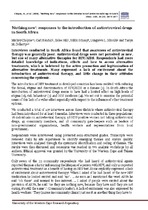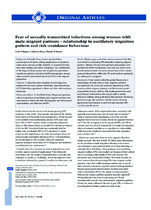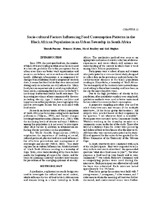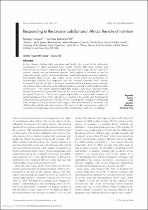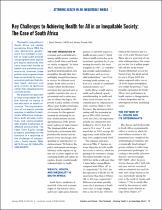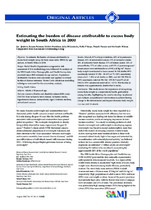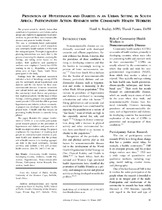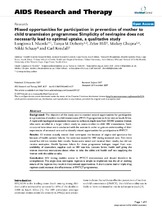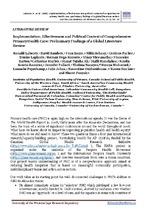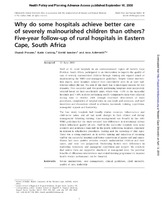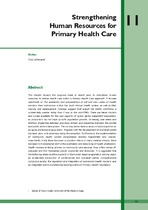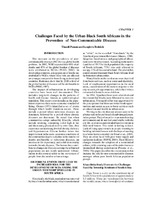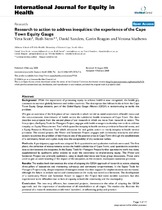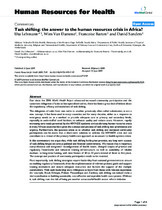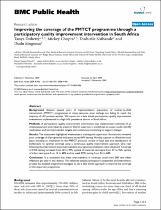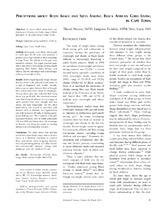Browsing Research Publications by Issue Date
Now showing items 21-40 of 792
-
"Nothing new": responses to the introduction of antiretroviral drugs in South Africa
(Lippincott Williams & Wilkins, 2006)Interviews conducted in South Africa found that awareness of antiretroviral therapy was generally poor. Antiretroviral drugs were not perceived as new, but one of many alternative therapies for HIV/AIDS. Respondents ... -
Fear of sexually transmitted infections among women with male migrant partners – relationship to oscillatory migration pattern and risk-avoidance behaviour
(South African Medical Association, 2006)BACKGROUND: In South Africa, former apartheid laws encouraged rural males seeking employment to migrate to urban areas, moving weekly, monthly or annually between their rural families and urban workplaces. The combination of ... -
Socio-cultural factors influencing food consumption patterns in the black African population in an urban township in South Africa
(Kamla-Raj Enterprises, 2006)The present study was undertaken to examine socio-cultural factors that influence food intake in different groups of people residing in a black township in Cape Town. Focus group discussions and in-depth interviews were ... -
Community intervention for the emerging epidemic of non-communicable diseases
(MedPharm Publications, 2006)BACKGROUND: Community health workers (CHWs) are lay people trained to assist with health care in their communities. This study took place at two sites in Khayelitsha, a township in the Cape Peninsula, from 2000 ... -
Responding to the crisis in sub-Saharan Africa: The role of nutrition
(Cambridge University Press, 2006)In the chapter dealing with education and health, the report of the influential Commission for Africa prioritises basic health systems, HIV/AIDS, malaria and tuberculosis. In contrast, nutrition is given less than half ... -
Key challenges to achieving health for all in an inequitable society: The case of South Africa
(American Public Health Association, 2006)The health inequalities in South Africa are rapidly worsening. Since 1994, the new democratic government has initiated a number of large-scale policies and programs with explicit pro-equity objectives that have improved ... -
Estimating the burden of disease attributable to excess body weight in South Africa in 2000
(South African Medical Association, 2007)OBJECTIVE: To estimate the burden of disease attributable to excess body weight using the body mass index (BMI), by age and sex, in South Africa in 2000. DESIGN: World Health Organization comparative risk assessment ... -
Prevention of hypertension and diabetes in an urban setting in South Africa: Participatory action research with community health workers
(International Society on Hypertension in Blacks, 2007)The project aimed to identify factors that contribute to hypertension and diabetes and to design and implement appropriate local interventions to prevent these non-communicable diseases and promote healthy lifestyles. This ... -
Missed opportunities for participation in prevention of mother to child transmission programmes: Simplicity of nevirapine does not necessarily lead to optimal uptake, a qualitative study
(BioMed Central, 2007)Background: The objective of this study was to examine missed opportunities for participation in a prevention of mother-to-child transmission (PMTCT) programme in three sites in South Africa. A rapid anthropological ... -
Sport for development. African international university Initiative (s.f.d-a.i.u.i.) justification and basic assumptions of a sport and development study programme in Southern Africa
(University of the Western Cape, 2008)This paper gives the vision of the initiators of the programme on the two basic elements of the title: 'Sport for Development' and 'African International Interuniversity Initiative'. This vision is already partly put in ... -
Implementation, effectiveness and political context of comprehensive primary health care: preliminary findings of a global literature review
(CSIRO, 2008)Primary health care (PHC) is again high on the international agenda. It was the theme of The World Health Report in 2008, thirty years after the Alma-Ata Declaration, and has been the topic of a series of significant ... -
Chronic non-communicable diseases
(Health Systems Trust, 2008)This chapter will examine the current actions, including lifestyle measures, for the prevention and management of non-communicable diseases within a South African context. It will also focus on the biological, behavioural ... -
Why do some hospitals achieve better care of severely malnourished children than others? Five-year follow-up of rural hospitals in Eastern Cape, South Africa
(Oxford University Press, 2008)Staff at 11 rural hospitals in an under-resourced region of Eastern Cape Province, South Africa, participated in an intervention to improve the quality of care of severely malnourished children through training and support ... -
Strengthening human resources for primary health care
(Health Systems Trust, 2008)This chapter reviews the progress made in recent years to strengthen human resources to deliver health care within a Primary Health Care approach. It focuses specifically on the availability and preparedness of old and ... -
Determinants of obesity in an urban township of South Africa
(MedPharm Publications, 2008)OBJECTIVE: To estimate the prevalence of overweight and obesity, and identify factors associated with Body Mass Index (BMI) and waist circumference (WC) among adults residing in an urban township in South Africa. DESIGN: ... -
Challenges faced by the urban black South Africans in the prevention of non-communicable diseases
(Kamla-Raj Enterprises, 2008)This paper was conducted to describe some of the circumstances that increases the risk factors for non-communicable diseases amongst the previously disadvantaged South African population. The work presented here is based ... -
Research to action to address inequities: The experience of the Cape Town Equity Gauge
(BioMed Central, 2008-01-04)BACKGROUND: While the importance of promoting equity to achieve health is now recognised, the health gap continues to increase globally between and within countries. The description that follows looks at how the Cape Town ... -
Task shifting: The answer to the human resources crisis in Africa?
(BioMed Central, 2009)Ever since the 2006 World Health Report advocated increased community participation and the systematic delegation of tasks to less-specialized cadres, there has been a great deal of debate about the expediency, efficacy ... -
Improving the coverage of the PMTCT programme through a participatory quality improvement intervention in South Africa
(BMC, 2009)Despite several years of implementation, prevention of mother-to-child transmission (PMTCT) programmes in many resource poor settings are failing to reach the majority of HIV positive women. We report on a data driven ... -
Perceptions about body image and sizes among Black African girls living in Cape Town
(International Society on Hypertension in Blacks, 2010)OBJECTIVE: To assess beliefs about body size (fatness and thinness) and body image in Black girls aged 10–18 years living in Cape Town. DESIGN: Exploratory using qualitative methods. SETTING: Cape Town, South Africa. METHOD: ...

